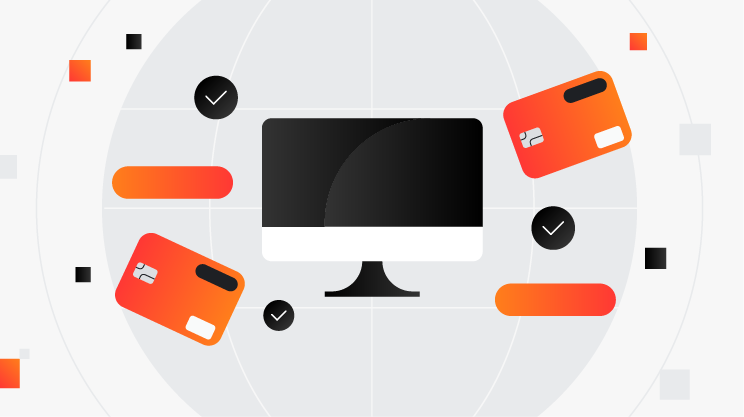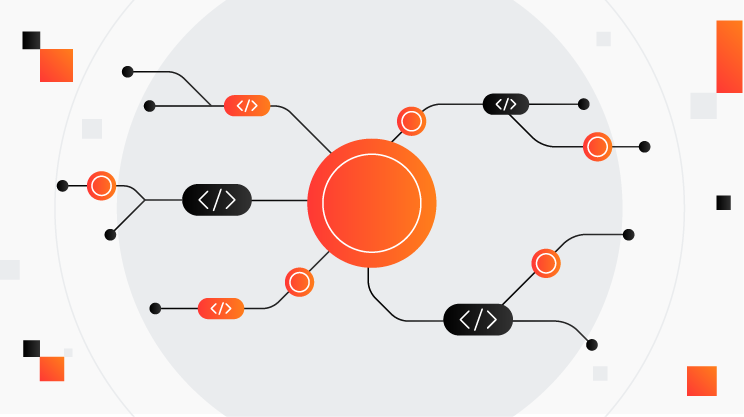Payment links: How they work and how to use them
Today's consumers demand convenience, speed, and flexibility in their shopping experiences, expecting to be able to purchase anytime, anywhere. Technology improvements and the widespread use of smartphones have made it possible to create seamless shopping experiences across many online platforms and other sales channels, including social media, messaging apps, and digital marketplaces. This has allowed consumers to make purchases with just a few taps on their devices.
This transformation of the retail landscape marks a significant shift in the way businesses reach and engage with their customers. The evolution highlights the need for flexible and secure payment options, with payment links standing out as a key solution. How do they work, and how would you use them?
What is a payment link?
A payment link is essentially a direct payment URL that merchants can generate instantly and send to their customers through various channels such as email, SMS, messaging apps like WhatsApp and Telegram, or social media. This link redirects the customer to a secure payment page where they can complete their purchase.
Airwallex's payment links offer global businesses a versatile solution to collect payments through cards and over 160 other methods globally in multiple currencies. Airwallex also has a set of financial tools that let businesses open accounts in many currencies, make transfers across borders, give out company and employee cards, and manage card expenses, reimbursements, and bill payments all on one financial solution.
Accept customer payments. Like a local.
Why should you use a payment link?
The appeal of payment links lies in their simplicity and efficiency. For businesses, payment links are a fast way to get payments without having to build a full checkout page or eCommerce store. This usually requires a developer to code. For customers, they present a convenient and accessible way to make secure payments online.
Any business looking to streamline its payment process and expand its market reach stands to benefit from incorporating payment links. Payment links simplify the payment process because it reduces the number of steps to purchase, leading to quicker customer payments.
For businesses like lawyers, consultants, and event organisers, payment links make it easier to collect deposits or advance payments. This makes the billing process simpler and helps them get money before an event. They're also vital for international commerce, allowing businesses to easily collect payments in preferred currencies without localised websites or payment gateways.
For example, Airwallex's payment links provide luggage brand July with a powerful tool to enhance their service to corporate clients. Instead of directing clients to pay through Shopify, July sends them a link for the required amount, allowing instant payment, streamlining their customer experience.
Also, for sales through social media, payment links enable direct purchases, enhancing the attractiveness of impulse buys and limited-time offers. This method especially benefits small businesses by eliminating the need for a traditional online storefront.
Likewise, boutique or high-end travel agents may use payment links to provide a convenient service to their clients, while also offering an on-brand or personalised experience.
It's important to distinguish between a payment link and a payment gateway. A payment link directs a customer to a payment page without the need for a website, while a payment gateway is integrated into the website's checkout process within the site. Each serves different business needs, with payment links offering more flexibility.
How do I collect payment with a payment link?
Payment links offer a convenient method for businesses to accept payments, since you can share your payment link via email, social media or embed it on your invoices. Solutions like Airwallex enable you to create a secure, direct pathway to receiving payments. To create a payment link on Airwallex:
If you are a new Airwallex customer, sign up for an account and complete the verification process.
Head to the "Payments" tab on your web app and click "Payment links."
Input transaction details such as amount, currency, and a description of the goods or services. You can also utilise customisation options like adding a business logo or a personal message to improve brand recognition and customer trust.
Airwallex will then generate a unique and secure URL. Copy and share this link with your customers through your choice of channels including email, SMS, messaging app, social media, or even by downloading the QR code.
Once your customer makes the payment, both you and the customer should receive a confirmation notification. You can verify the transaction on your end through the Payments tab to ensure everything matches the agreed upon amount and details.
Is it safe to use payment links?
Airwallex has put in place security measures to protect transaction integrity and confidentiality.
To protect you against fraud, Airwallex has a risk engine that uses machine learning models to detect fraudulent transactions from legitimate ones. A 3D Secure (3DS) verification is triggered whenever a payment meeting certain conditions is made. Those conditions may depend on where your customer is located, the default rules your payment provider has, and/or the custom rules you've set to safeguard against fraud.
If the transaction needs 3DS, your customer will need to enter two-factor authentication (2FA) like a one-time password (OTP) or biometric information to approve their purchase. Although 3DS is optional in some regions, the Strong Customer Authentication (SCA) regulation mandated in Europe will require using 3DS for card payments.
Why use Airwallex’s Payment Links?
Airwallex emerge as a top selection for global businesses looking to improve their entire financial operations. With Airwallex’s Payment Links, businesses can enjoy:
Hassle-free set up: Set up a payment link instantly within the Airwallex app and share with customers, no coding required.
Multi-currency and local payment method support: Airwallex's Payment Links provide businesses the flexibility to accept payments from anywhere in the world, in multiple currencies, with 160+ payment methods. This ability not only simplifies the transaction for customers worldwide but also positions businesses to tap into international markets with ease.
Embed links into your invoices: Automatically generate Payment Links via Airwallex’s pre-built integrations with accounting platforms like Xero, QuickBooks, and NetSuite. Links can be easily embedded into invoices generated by these platforms for streamlined reconciliation.
Customised branding: Payment links can be customised with your branding, logo, and business name. Customers can also be directed to a custom domain to build trust during the payment process.
No or low FX conversion fees: Once a customer pays through a link, you can collect and hold money from your international customer in your Airwallex multi-currency account. You can then pay your global suppliers from the held currency balances, in 10+ currencies to avoid forced FX conversions.
Above all, Airwallex's Payment Links are designed to work in harmony with our other offerings. Airwallex’s end-to-end financial solution helps businesses around the world collect and hold international customer payments in their Airwallex multi-currency accounts. It can also help to facilitate fast and cost-efficient cross-border transfers when payouts are needed. Airwallex also offers spend management software, can issue corporate cards, and manage bill payments, to help teams stay in control of all purchases, all from a single platform.
Take Hong Kong-based SME DigitSense, who are using Airwallex payment links with their global clients for easy credit card bill settlement. This allows DigitSense to promptly receive payments without incurring TT fees for major currencies, benefitting both parties.
Get the business account built for global growth
Frequently asked questions
1. What is the difference between a payment link, a checkout button and an invoice?
A payment link is a unique URL that directs a customer to a payment page where they can complete a transaction. It's a flexible option that can be shared through email, messaging apps, or even social media. It's great for businesses without a traditional eCommerce platform or their own website.
A checkout button, on the other hand, is embedded directly within a merchant's website or app. This makes it easy for your customers to pay quickly and easily when they shop online.
Lastly, an invoice is a detailed document issued by the seller to the buyer, listing the products or services provided along with quantities, prices, terms, and payment details. Invoices often facilitate payment through direct bank transfers or cheque payments. Using Airwallex, businesses can directly embed Payment Links into their invoices via Xero, Quickbooks, and Netsuite, automating reconciliation when they’re being paid.
Each of these payment facilitators serves unique operational needs, offering businesses flexibility in how they manage transactions with their customers.
2. Why would I need a payment link when I have a website or app?
Even with a fully functional website or app, Payment Links offer the most flexibility for transactions outside uses the standard eCommerce flow. They provide a secure and straightforward method for collecting payments on platforms like email, messaging apps, and social media, without the need for the customer to physically navigate the business's website or app.
3. Can I customise my Airwallex Payment Link?
Absolutely. Customisation of Payment Links is encouraged, so you can align with your business branding and provide a seamless payment experience for your customers. Airwallex offers a range of customisable options, including a custom domain that enables businesses to tailor the appearance and functionality of their payment requests.
4. Does Airwallex Payment Links support multiple payment methods?
Yes, one of the biggest benefits of using Airwallex's Payment Links is that they work with many different payment methods and currencies your customers like. This includes traditional methods such as credit and debit cards, bank transfers, and newer digital forms like mobile wallets and buy-now-pay-later.
Share

David is a fintech writer at Airwallex, specialising in content that aids EMEA businesses in navigating global and local payments and banking. With a rich background in finance, business, and accountancy journalism, David brings over a decade of experience. Previously, he was the Head of Content and Press at a leading financial services company and trade journalist at a media group specialising in business and finance.
View this article in another region:AustraliaChinaEurope - EnglishEurope - NederlandsMalaysiaNew ZealandSingaporeUnited StatesGlobal
Related Posts

What is an eCommerce payment gateway and how does it work?
•12 minutes

